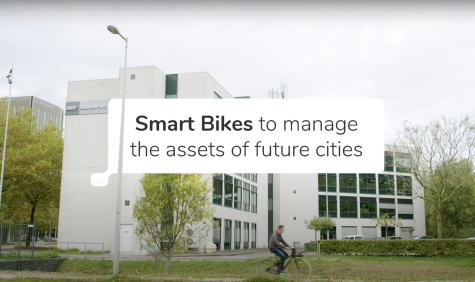Safer cities with smart bikes, edge computing and public clouds
Small edge devices attached to bikes help improve the safety and wellbeing in cities through analysing the surroundings in an autonomous way. In the Smart Bikes project, HvA, Velotech Solutions and SURF are collaborating on solutions for a smart city. SURF is developing the digital infrastructure needed to remotely control a fleet of bicycles in a city, using commercial cloud services.
Hogeschool van Amsterdam (HvA) runs a Maintenance Lab where several research and development projects in the field of smart industry and smart cities take place. One of them is a Smart Bikes project done in collaboration with Velotech Solutions.
Bikes that can see
Has a streetlight in the neighbourhood stopped working or is it tilted? Are there damaged street signs by the roads? Problems like this need to be solved in a timely manner to maintain a safe city environment. The Smart Bikes project at HvA provides an affordable and flexible solution. Messengers on bikes delivering goods ride all over the city, including streets where cars do not enter. All this makes their bikes an optimal vehicle to accelerate the adoption of smart city applications.
Autonomous smart devices
Smart solutions rely on modern digital infrastructures and often involve complex algorithms. This applies to the Smart Bikes project at HvA as well. The edge devices on bikes consist of an edge-computing unit with a GPU (NVIDIA Jetson Nano) with a camera and additional sensors. The camera takes pictures in the streets and the edge-computing unit runs deep-learning algorithms to decide in real-time whether there is a problem detected in the image, for example a broken streetlight. Further algorithms take care of removing privacy-sensitive information and the images are sent to a central cloud location over a 4G network. In this way, the information about the problems in the city is available immediately in a fully automated manner.
Extending a public cloud environment towards the edge
In this project, SURF is expanding beyond its data centre and brings expertise in cloud computing and edge computing to the researchers. This project is a typical example of a hybrid-cloud use case, where a fleet of edge devices is centrally managed from the cloud. SURF decides to leverage available edge solutions from public cloud providers. Instead of building a custom tailored solution from scratch, a service for intelligent device management from Amazon Web Services plays a pivotal role here. AWS IoT Greengrass maintains a software lifecycle on all edge devices, making it possible to build and deploy software on the devices from a central place conveniently, even over an unstable network.
Building cloud solutions with SURF
However, the digital infrastructure for the smart bike project needs more than just a remote device management. Communication channels for sending commands to the edge devices and receiving images need to be established. A central storage place for the images is needed. For this, best practices for collaborating in the public environment in a secure way need to be put in place. SURF provides an extensive advice when it comes to research projects and public clouds. With the vast number of managed services and a consumption-based pricing model, public clouds make it possible to build prototypes quickly and scale. Certified cloud solution architects are there at SURF to guide researchers, transfer knowledge and implement an optimal solution for their use cases.
Machine learning model lifecycle
The edge devices on the bikes run autonomously, using deep-learning models for object detection in images. For every use case, such as detecting broken streetlights, there is a dedicated model. Writing and improving these models is a principal research activity within this project. Therefore, besides the edge-computing infrastructure, machine learning is an equally important part of the project. SURF advises on best practices for re-training, versioning and book-keeping results from new models. A dedicated cloud service Amazon SageMaker is used for this, making it easy for the researchers to frequently improve and deploy their models.
Supporting research with the modern cloud infrastructures
With the Smart Bikes project, HvA, Velotech Solutions and SURF take steps together to enable smart-city solutions of the future. This project is connected to the European Digital Innovation Hubs programme and is a part of the SURF’s innovation roadmap to support modern cloud infrastructures, including edge computing and public clouds. To stimulate the adoption of public cloud services in research, SURF has also launched a call for proposals where researchers can apply for an initial budget and consultancy.


